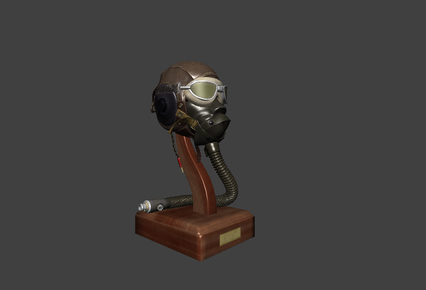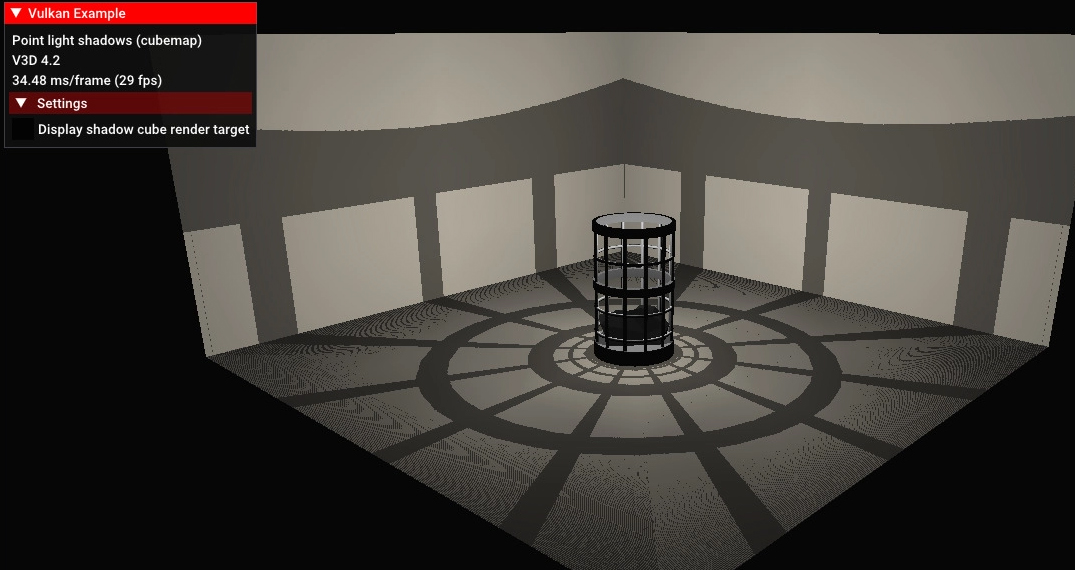Vulkan Support on the Raspberry Pi 4: Progress and Demo Pictures
The Raspberry Pi is well-known for its size and value, but soon it could be recognized for its considerable performance. A few months ago, the Raspberry Pi Foundation announced the development of Vulkan support on the Raspberry Pi 4. Today the team released an update regarding the current state of the project as well as demo pictures to show their progress.

Vulkan is a cross-platform graphics API. In January, the team managed to render a colored triangle using just a small portion of the Vulkan 1.0 API, but today they're using the Khronos Conformance Test Suite to pass over 70,000 tests.

The demo pictures are visually impressive, especially when placed alongside the triangle rendered in January. However, the team has quite a bit of work ahead of them before the driver can be used in something as demanding as a video game. Until then, the workload is simply too complex to handle.
The team already has an action plan lined up for the next couple of months. They intend to provide basic support for the Vulkan 1.0 feature set and then move on to CTS conformance. If you want to read more about the current state of development, check out the full post on the official Raspberry Pi blog.
Get Tom's Hardware's best news and in-depth reviews, straight to your inbox.

Ash Hill is a contributing writer for Tom's Hardware with a wealth of experience in the hobby electronics, 3D printing and PCs. She manages the Pi projects of the month and much of our daily Raspberry Pi reporting while also finding the best coupons and deals on all tech.
-
bit_user Reply
I figured it'd come up, so I thought I'd get ahead of it. But Crysis preceded Vulkan by about 8 years, so it's not remotely relevant.bit_user said:Too bad it can't play Crysis.
However, it does give me a chance to share some pertinent details about the Pi's GPU. So, let's compare it with the consoles and high-end cards at the end of 2007, and with entry-level PC iGPUs and dGPUs, available today.
As there seem to be no theoretical specs published for the Pi, I've done the best with what I could find. Also, in an effort to be fair, I've used base clocks for compute performance. Finally, for consoles and iGPUs, I'm only looking at the theoretical performance of the graphics portion.
MakeModelIntroducedMSRPGFLOPSGB/secPiv4 (2GB)2019-06
$35
32
4.4SonyPS32006-11
$500
251
22.4MicrosoftXBox 3602005-11
$400
240
22.4Nvidia8800 GT 2007-10
$200
336
57.6AMDHD 38702007-11
$220
497
57.6NvidiaGT 10302017-05
$70
942
48.0AMDRX 5502017-04
$80
1126
112.0IntelHD 6302017
$64
441
38.4AMDRX Vega 82019-07
$100
1280
46.9
Hopefully, this will establish some realistic expectations. Put plainly: the availability of Vulkan support will not magically transform the Pi into a console-class gaming machine. Not even on par with consoles of the Crysis era. Not even close.
References:
https://www.raspberrypi.org/forums/viewtopic.php?f=63&t=244519&start=50https://magpi.raspberrypi.org/articles/raspberry-pi-4-specs-benchmarkshttps://en.wikipedia.org/wiki/PlayStation_3_technical_specificationshttps://www.psdevwiki.com/ps3/RSXhttps://en.wikipedia.org/wiki/Xbox_360_technical_specificationshttps://en.wikipedia.org/wiki/List_of_Nvidia_graphics_processing_unitshttps://en.wikipedia.org/wiki/List_of_AMD_graphics_processing_unitshttps://en.wikipedia.org/wiki/List_of_Intel_graphics_processing_unitshttps://en.wikipedia.org/wiki/List_of_AMD_accelerated_processing_units -
misanthropic-gamer Reply
So.. offense meant, all of the Pi's are worthless for graphics; especially gaming anything. Raspberry Pi is a mostly-lame SoC that can run linux... and not much else. BTW, I own several, so I'm not disrespecting. I'm just throwing down the facts.bit_user said:I figured it'd come up, so I thought I'd get ahead of it. But Crysis preceded Vulkan by about 8 years, so it's not remotely relevant.
However, it does give me a chance to share some pertinent details about the Pi's GPU. So, let's compare it with the consoles and high-end cards at the end of 2007, and with entry-level PC iGPUs and dGPUs, available today.
As there seem to be no theoretical specs published for the Pi, I've done the best with what I could find. Also, in an effort to be fair, I've used base clocks for compute performance. Finally, for consoles and iGPUs, I'm only looking at the theoretical performance of the graphics portion.
MakeModelIntroducedMSRPGFLOPSGB/secPiv4 (2GB)2019-06
$35
32
4.4SonyPS32006-11
$500
251
22.4MicrosoftXBox 3602005-11
$400
240
22.4Nvidia8800 GT2007-10
$200
336
57.6AMDHD 38702007-11
$220
497
57.6NvidiaGT 10302017-05
$70
942
48.0AMDRX 5502017-04
$80
1126
112.0IntelHD 6302017
$64
441
38.4AMDRX Vega 82019-07
$100
1280
46.9
Hopefully, this will establish some realistic expectations. Put plainly: the availability of Vulkan support will not magically transform the Pi into a console-class gaming machine. Not even on par with consoles of the Crysis era. Not even close.
References:
https://www.raspberrypi.org/forums/viewtopic.php?f=63&t=244519&start=50https://magpi.raspberrypi.org/articles/raspberry-pi-4-specs-benchmarkshttps://en.wikipedia.org/wiki/PlayStation_3_technical_specificationshttps://www.psdevwiki.com/ps3/RSXhttps://en.wikipedia.org/wiki/Xbox_360_technical_specificationshttps://en.wikipedia.org/wiki/List_of_Nvidia_graphics_processing_unitshttps://en.wikipedia.org/wiki/List_of_AMD_graphics_processing_unitshttps://en.wikipedia.org/wiki/List_of_Intel_graphics_processing_unitshttps://en.wikipedia.org/wiki/List_of_AMD_accelerated_processing_units -
bit_user Reply
That's basically what I was trying to get at, but some people really don't like anything negative being said about the Pi.misanthropic-gamer said:So.. offense meant, all of the Pi's are worthless for graphics; especially gaming anything.
So, I thought I'd post up the data, and folks could see for themselves just how it stacks up.